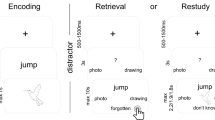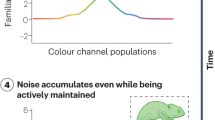Abstract
A MAJOR concern of current memory research is to identify how information is encoded and transferred from short term memory (STM) to long term memory (LTM)1,2. It has been reasoned that while an item remains in STM, it can be maintained through rehearsal; as a consequence, the corresponding LTM trace is built up. Thus, one may postulate that the adequacy of an item's registration in LTM is a positive function of the length of its stay in STM. Such a mechanical and simplistic account of memory has been challenged by a series of experiments which showed that when short term storage times were measured, these times did not predict long term retention3,4. We report here an experiment which manipulated the processing time as well as the processing context and showed that the processing time had differential effects, sometimes beneficial, sometimes harmful, and sometimes neutral, on an item's long term retention, depending in which type of processing context the item was embedded. Such results argue for a perceiver–environment interactive theory of memory.
This is a preview of subscription content, access via your institution
Access options
Subscribe to this journal
Receive 51 print issues and online access
$199.00 per year
only $3.90 per issue
Buy this article
- Purchase on Springer Link
- Instant access to full article PDF
Prices may be subject to local taxes which are calculated during checkout
Similar content being viewed by others
References
Waugh, N. C., and Norman, D. A., Psychol. Rev. 72, 89–104 (1965).
Shiffrin, R. M., and Atkinson, R. C., Psychol. Rev., 76, 179–193 (1969).
Craik, F. I. M., and Watkins, M. J., J. Verb. Learn. Verb. Behav., 12, 599–607 (1973).
Woodwar, A. E., Bjork, R. A., and Jongeward, R. H., J. Verb. Learn. Verb. Behav., 12, 608–617 (1973).
Neisser, L., and Seller, H. K., Br. J. Psychol., 56, 349–358 (1965).
Posner, M. L., and Konick, A. E., J. Exp. Psychol., 72, 221–231 (1966).
Watkins, O. C., and Watkins, M. J., J. exp. Psychol., Hum. Learn. Mem., 1, 442–452 (1975).
Author information
Authors and Affiliations
Rights and permissions
About this article
Cite this article
TZENG, O., COE, W. & HUNG, D. Role of stimulus environment and duration of processing in long term memory. Nature 264, 56–57 (1976). https://doi.org/10.1038/264056a0
Received:
Accepted:
Issue Date:
DOI: https://doi.org/10.1038/264056a0
Comments
By submitting a comment you agree to abide by our Terms and Community Guidelines. If you find something abusive or that does not comply with our terms or guidelines please flag it as inappropriate.



